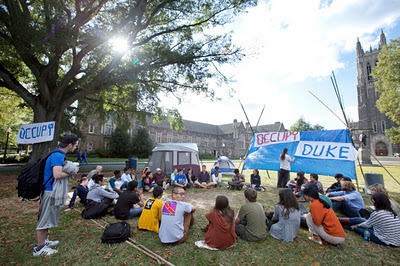The Occupy Movements and the Universities

The OccupyMovements and the Universities by Mark Naison | Special to NewBlackMan
The Occupation movements spreading around the nationand the world have the potential to revitalize University life,particularly those initiatives involving community activism and thearts.. The role of arts activists in Occupy Wall Street is a storythat has not been fully told,. Community arts organizations in New Yorksuch as the South Bronx's Rebel Diaz Arts Collective and Brooklyn's Global Block Collective have been involved with Occupy Wall Street foralmost a month, making music videos on the site, documenting the movement'sgrowth through film, and trying to bring working class people and people of colureinto the movement. The Occupation has become an essential stopping point for awide variety of performing artists, none of whom have asked for payment fortheir appearances. Universityfaculty and participants in community outreach initiatives can only benefitfrom tapping into this tremendous source of energy and idealism. I have neverseen students on my campus so excited about anything political or artisticas they have about these Occupation movements, which have spread into outerborough New York neighborhoods ( We have had "Occupy the Bronx")as well as cities throughout the nation and the world. What themovement has done is reinvigorate democratic practice- much of it face to face-widely regarded as nearly extinct among young people allegedly atomized bytheir cell phones and iPods.
One my students,a soccer player at Fordham said the following about her experience on a march across the Brooklyn Bridge that led to mass arrests. "Going tothe protest I felt like this was the closest I was going to get to reliving myfather/uncle's young adulthood! While we were stuck on the bridge people werepassing around cigarettes, water, food anything anyone had they shared.Announcements were organized so everyone knew what was going on. People wereyelling were changing the world! THE WOLRD IS WATCHING. I called my father onthe bridge told him I was getting arrested, and I could tell he was proud! Itwas unbelievable". Her sense ofexcitement about the energy and communal spirit at OWN mirrors my own. Eachtime I have been at OWS I have sat in on discussion groups created on topicsranging from Mideast politics, to understanding derivatives, to educationalreform. The discussions I have participated in have been rigorous,political diverse, and to be honest much more vibrant than mostcomparable discussions I have been part of at universities.
Those of uswho work at Universities need to find ways of connecting to a movementwhich has inspired so much creativity and intellectual vitality.. As someonewho has been to many "Occupation" events, ranging from teach ins, to grade ins,to marches, and has spoken about this movement at my own university and toglobal media, I have experienced this energy and vitality first hand. But mostimportant, my STUDENTS have experienced this and it has given them a sense thatthey have the power to make changes in a society which they feared had becomehopelessly stagnant and hierarchical.
Consider theremarks of 2010 Fordham grad Johanne Sterling who works at Fordham's DorothyDay Center for Service and Justice, about what participating in this movementmeant to her, even though the experience got her arrested and sprayed withmace:
"I had plans to attend a peaceful protest on Wall Street. . . I was happy to know that I was offering my voice and my support to a movementI believed in. As a young person in this country, I cannot say that I have notgrown more and more unnerved with the injustices I see every day. The fact thatour government is quietly but surely taking away our democratic rights (Firstwith the Patriot Act, ironically named, and then with new voting restrictionsthat are being put into law), the fact that so many of my fellow graduatescannot find meaningful, rewarding work no matter how hard they try, the factthat our country's infrastructure is falling apart while the richest 1%continue to increase astronomical amounts of wealth, and the fact our justicesystem was able to execute and continue to execute and/or imprison innocentindividuals disproportionately based on their socio-economic position and theirethnicity are simply a few reasons as to why I decided to attend therally." This kind ofcivic consciousness and social justice activism is precisely what so manyprogressive scholars and university based community outreach programshave sought to inspire. It is being brought to life by young people themselvesin this growing national movement.
There are nowover 100 Occupations in cities throughout the nation. They are part of a globalawakening of young people that has caused governments around the world totremble, and financial elites to face the first real challenge to their powerin decades We in the Universities did not create this movement. Butwe ignore it at our peril. It brings to life many things we have been teaching.And it does something that we should be doing, but aren't doing enough- itempowers our students!
***
Mark Naison is a Professor of African-American Studies andHistory at Fordham University and Director of Fordham's Urban Studies Program.He is the author of two books, Communistsin Harlem During the Depression and WhiteBoy: A Memoir. Naison is also co-director of the BronxAfrican American History Project (BAAHP). Research from the BAAHP will bepublished in a forthcoming collection of oral histories Before the Fires: An Oral History of African American Life From the1930's to the 1960's.[image error]
Published on October 29, 2011 12:04
No comments have been added yet.
Mark Anthony Neal's Blog
- Mark Anthony Neal's profile
- 30 followers
Mark Anthony Neal isn't a Goodreads Author
(yet),
but they
do have a blog,
so here are some recent posts imported from
their feed.



